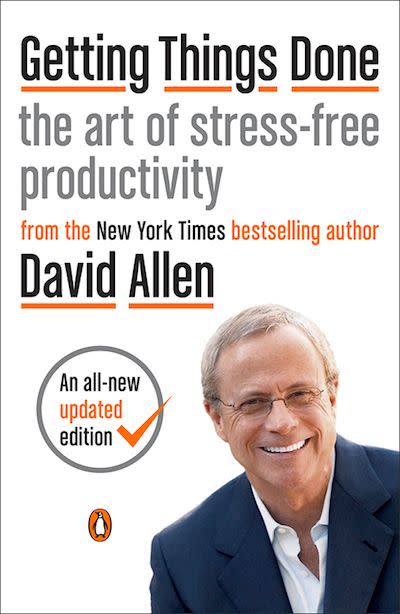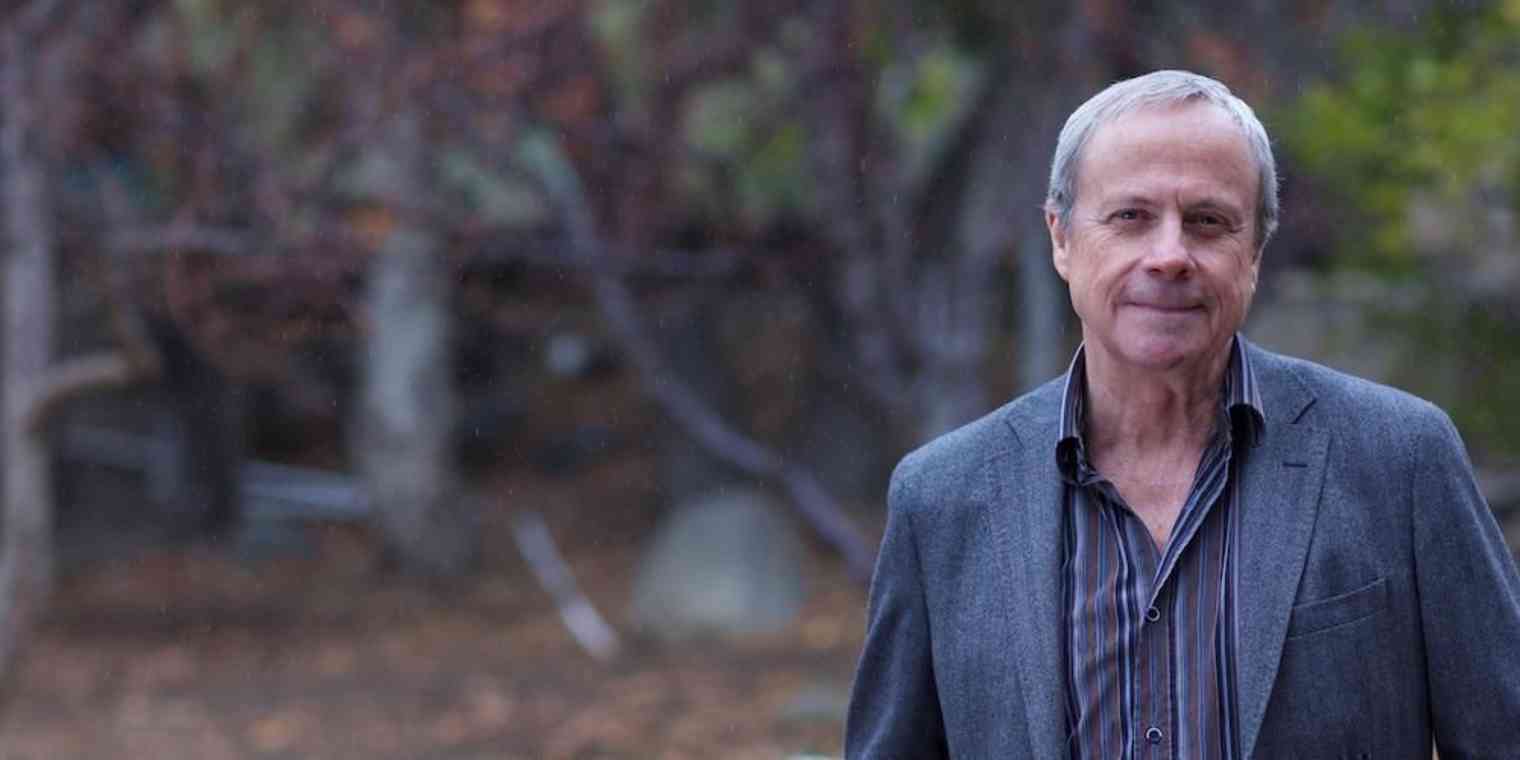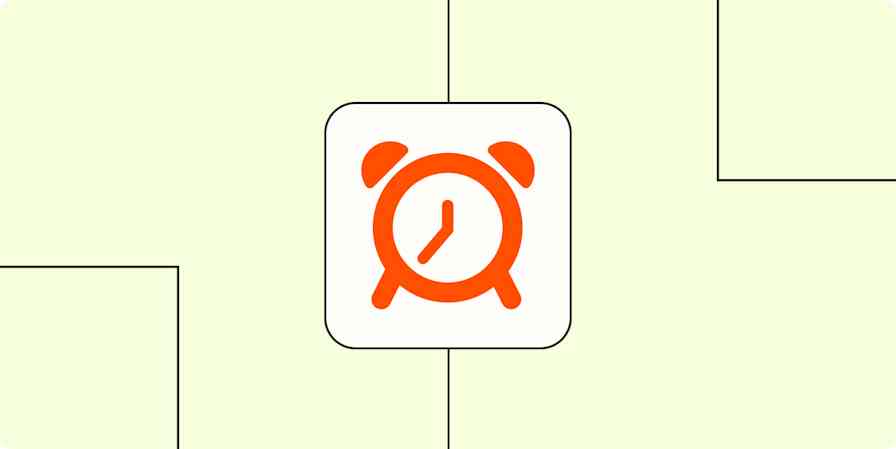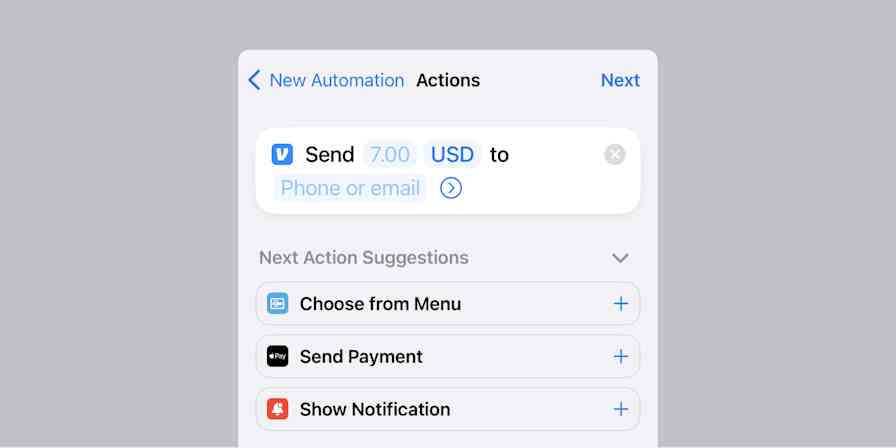Author and consultant David Allen first published his hallmark book Getting Things Done in 2001, and it's still relevant today. It's part manifesto and part tutorial with explicit instructions for how to go about getting things done. Allen's methodology, commonly referred to at GTD (he's trademarked both Getting Things Done® and GTD®), says that to get through daily life and work efficiently, we need a system that allows us to unload all the ideas swirling in our head and put them someplace we trust, be it on paper or a digital equivalent.
The heart of the GTD process has nothing to do with following its five steps or doing more with less. Rather, it's that we find clarity when we offload our thoughts, and through this clarity, we can give our full attention to whatever it is we do. In this interview done by video call from his home in Amsterdam, Allen reflects on the promises of increased personal productivity and what it delivers to people on a personal and human level.
Getting Things Done® and GTD® are registered trademarks of the David Allen Company.

Jill Duffy: I wanted to ask about how personal productivity has become more and more of a selling point for products, not just in the business software space, but also for individual consumers. What are people trying to hook into when they're promised increased productivity? What does that mean to somebody on an emotional level?
David Allen: The bottom line is I don't know. I have an educated guess. The self help movement has become so mainstream to begin with. Secondly, the number of people who are feeling overwhelmed and might need help to thread through their crazy stress-of-opportunity worlds is growing.
[As to what it promises,] more opportunities, I would imagine. There's a subtlety to what my stuff produces, which is not time; it's space. More room. You need more room in your head.
It doesn't take any time to have a good idea or to be more creative or to be innovative or to be present or to be loving. Those don't take time, but they take room. So if you're distracted, if your brain is spinning around three meetings or some major issue, it's hard to be creative, innovative, present, strategic, or any of that good stuff.
My methodology creates space. How people use it is as different as there are people.
There is so much potential opportunity that people see out there. Whether it's the startup world—"Oh my god, I could go make a gazillion dollars and still be 21 years old!" or whatever—because of the myth of that success, and the real opportunities out there that way, I think having a competitive edge is as much a part of it as anything else.
At the same time, overlay that with millennial standards of, "Hey, I just want a nice quality of life. I don't need to make a lot more money. I want to be able to yoga at nine o'clock in the morning and do email at eleven o'clock at night. Don't fence me in. I'll be highly productive, but I'll do it in my own time and space, thank you very much."
It doesn't take time to have a good idea, or to be more creative, or to be innovative, or to be present, or to be loving. But it takes room.
JD: That's interesting. It speaks to this idea that increased productivity allows people to have a more diverse life. With the opening up of the space of the brain, with that opening up of the time, it's not necessarily that you can do more in the vein of what you're already doing, but it gives you opportunity to do different things as well.
DA: Sure. We've had a long run of intrapreneurialism, entrepreneurialism, startupism, and all that kind of stuff. And to your point, people say, "I want to start my second career while I'm still doing this one. I want to know how to know how to do this next gig." Or "I need to start doing that" or "I want to write the great book." But if you're in a crisis, you're only focused on dealing with the crisis. If you don't have a crisis, then all the demons come rushing through. "Oh my god, there's a seminar I could take! I should be doing yoga! I could design software! I need to write a book!" It's the stress of opportunity that people have these days because there is such an open field, and it's such a global world now.
All you have to do is surf the web for a couple of minutes to find a job anywhere doing anything. I think part of that is part of it as well.
But I've got to tell you, I've had trouble selling productivity for 35 years!
JD: What do you mean by that?
DA: Well, come on. I solve a problem most people don't know they have. Getting Things Done is not so much about getting things done; it's about being appropriately engaged with your life so that you can be present with whatever you're doing.
The people most interested in GTD are the people who need it the least. They're already the most productive, positive, creative, strategic, cool, forward-looking people! The good news for me is that I got to deal with some of the best in the world. The bad news is that the people who really need it don't even think they need it.
What's the strategic value of clear space?
Anyway, I'm not a marketing expert. As it is, GTD does reach people, but it creates an attraction to a certain type of person, and they already know the value of systems. They've already tried systems. And their own productivity and creativity [comes from] throwing themselves out of their comfort zones.
JD: I think the self-help genre is often simply affirmative for people. People want to be told that what they're already doing is correct or is valuable.
DA: Yeah.
JD: I want to shift to talking about mindfulness and meditation. It seems like every 20 or 30 years or so, it bubbles up again and there's a renewed interest in it. Do you have any thoughts on why meditation and mindfulness has struck a chord with people who are so invested in personal productivity and being high achievers?
DA: I think it has to do with the values and standards of... I'd say "the new generation," but it's not by age. It's people who are more into quality of life than quantity of life. That certainly rings a bell with a lot of us. I'll be 73 next month, so I'm on the front end of the boomers. And the boomers have been into that forever.
Now they've made money and they've retired. Of course they're going to go to the retreat and be silent in Bali for 10 days. If they can afford to do that, then what the heck? They still have some of those standards.
The millennials and whatever the next gen is going to be called are very much into quality instead of quantity.
JD: Do you practice any mindfulness, meditation, yoga?
DA: Sure. Yeah. I've been doing that for 50 years.
JD: How does it help you focus on quality rather than quantity or find some other kind of balance?
DA: If you read any of the new cognitive science literature over the last 10 or 15 years, one of the things it has validated is that your brain needs a rest! You need to stop thinking!
You can only be concentrating and thinking about four hours a day max. It's a cognitive muscle that wears out just like your other muscles do. If you read Baumeister and Tierny's book Willpower, decision fatigue is a real thing. Don't try to get yourself to do [anything that would be a] change of habit after five o'clock in the day if you've had to make a lot of decisions earlier that day. You have no muscle left. You're toast.
Understanding that you need breaks—that your brain needs to break, to stop, to daydream, and to allow itself to be spontaneous—is now cognitive science-validated information.
Sleeping on things is the best ways to solve problems because it allows the unconscious to make connections that bypass your conscious conditioning.
There's a lot of data out there about that now. I've known it for years. It helps to rest, relax, let your brain think about nothing. I just thought I was lazy for the fact I loved to take a nap and loved to think about nothing. Now I understand that I'm just cognitively intelligent! [Laughs.]
Your brain needs a rest! You need to stop thinking!
I call it the strategic value of clear space. I've dealt with some big executives. One of them, his main gripe was that what every one of his executives needs is more reflection time. They get wrapped around the axel, get down in the weeds, and then lose focus, lose everything that they need. There is a very practical reason for meditation.
JD: I wanted to ask about this concept of people who don't always follow GTD to a tee. People borrow from it, change it, adapt it. I love that. When I read different people's blogs and instructions about how they use GTD with a certain app or for their own life, there's a real sense that everyone should take the parts that work, follow the baseline principles, and adapt it. Have you adapted your own use of GTD in your own life over the years, and if so, how?
DA: Not really, other than the typical adaptations, like some lists work better than others as my lifestyle changes. It was useful to have an online @computer list in addition to an offline @computer list, for example. I'm on planes a lot, and if there isn't good Wi-Fi, it's nice to not have to look at all the other stuff. I have a creative writing @computer list separate from the other @computer list because my creative writing actions tend to constipate my business actions if I put them on the same list. Little tweaks like that.
Because GTD is system-independent, you have to customize it right away in terms of how you use it and which kind of lists you use. It's really funny how many people come back after about three years and say, "David, what I wound up with is what you suggested to begin with." I applaud people. I say go down all kinds of rabbit trails if you want, but I'll see you when you come back.
JD: Maybe people need to feel like they've figured it out for themselves.
DA: Could be.
My job is as an educator, not a motivator. I'm not a motivational speaker. I'm really an educator and a researcher. You want a clear head? Here's the fastest and easiest way to do it. You got an easier, faster way to get it clear? Share it with me. I'll test it out, and if it's true I'll teach it in the next book.
But nothing's changed. We just published Getting Things Done for Teens, and there's no difference in the methodology. A CEO needs to empty his or her pack and decide what to do with all the notes and business cards they got. A nine-year old just needs to empty his or her pack and make sure mom gets the things she needs to sign. Same principle, just different content.
The basics will be universal 100 years from now. You're still going to need an In basket if you're flying to Jupiter. You're still going to need Next Actions on actionable items. You're still going to need a Projects list to stay clear. You're still going to need a way to keep track of stuff you're waiting on to come back from people. You're still going to need to review all that and get it current at least once a week so you don't get behind the curve and end up driven by latest and loudest. That's universal. That doesn't change. It won't change.
As long as you have a clear head, then there's nothing on your mind except what you want on your mind. And then you're doing it.
And that's to another point you wanted to discuss, which is, "What are the misconceptions people have about productivity?" The biggest misconception is they think it means working harder, faster, longer, bigger. Yeah, sometimes you have to put your shoulder to the wheel, but it's really not about that. It's really about being able to create appropriate space and create appropriate clarity so that you're present with whatever you're doing. It's the best way to cook spaghetti, or hit a golf ball, or fire somebody. It doesn't matter what you're doing. That happens to be the optimal productive state, just being present.
JD: Do you differentiate your wording between productivity and personal productivity? I find that sometimes when I tell friends that I write about productivity, they say, "Do you mean the ratio of input to output on the national scale?" And I'll have to clarify that I mean personal productivity.
DA: Well, my work started out individual, and then it very quickly had an impact on groups, teams, and the whole enterprise. If the whole company starts to buy into the lexicon of GTD, then you don't start meetings without asking, "What are we trying to accomplish, and by what time today?" In discussion, people start to say, "So what's the next step? How are we going to decide? Who's doing that?" That can change a whole culture! The principles that apply to personal productivity are the same in my experience as those that apply to a group's productivity.
If you were part of a group or a team, I'd walk in and say, "What's got the team's attention right now?" Then I'd say, "Well great. Let's throw that on the board." Then we can ask, "Well, what does that mean? Is there some project around that? What's the outcome that's desired?" We're going to capture it. Then we're going to clarify it for the team. Then we're going to organize it: What are the key pieces or key components, and who owns those? And then we're going to ask who needs to review the status of this and how often and at what recursion? That's step 4, review.
As long as you have a clear head, then there's nothing on your mind except what you want on your mind.
What you probably won't get to or won't need to get to sometimes is the "next action" step because whoever gets the accountability for the different pieces has to figure that out themselves.
So personal application of GTD makes team application hugely easier.
JD: I was going to ask you about the transition of GTD from before mobile phones and ubiquitous computing to after, but I feel like you've already covered it in talking about how GTD is really rooted in principles of making space in your head.
DA: Basically all the tech stuff is just list managers. Are you old enough to remember the Palm Pilot?
JD: Yes, absolutely.
DA: What a great list manager that was. That was so cool. But they're all just list managers, quite frankly. I've worked with some of the best and brightest people on the planet to try and see if there were a next exponential leap that you could do in software to support the cognitive thought process and decision-support process, and the answer's no.
It's too complex. You still have to be pretty cognitively labor intensive to figure out, "What do I use Evernote for? Do I need to put that in Dropbox? And when I send an email, where do I copy that?" Pfft!
What you really want is the ideal dashboard. Microsoft thought it was going to build a dashboard, but when I saw it, it was just a way to add a bunch of crap onto your home screen. It had nothing to do with your thought process whatsoever.
So we've tried. I've tried it truly with some of the best you'd ever meet, in terms of looking at what was out there right now, everything from Asana to Things to Omnifocus—all the various tools, and they're all just list managers with bells and whistles. And that means they're all good, if you use them.
I'm still using IBM Notes, but I use an overlay that my friend designed for Notes that makes it a little sexier to do the GTD stuff. In other words, if I send you an email right now and I'm expecting you to get back to me, there's just a radio button that I hit called Waiting For. It automatically sticks it on my Waiting For list, automatically puts your name on it, automatically date-stamps it. Duh. But there's nothing else out there that comes close to even doing that!
JD: Do you have any favorite apps, which don't need to be apps for GTD or even in the productivity space? Any apps, games, websites, interesting things you like, anything you're really into lately?
DA: What am I into lately? Not really. Everything is so commodity to me. I use Word, Excel, Snagit. Thank god for Snagit. IBM Notes. There's still nothing even close to what Notes was able to build and do. Too bad it's in its sunset days because nobody ever got it. Nobody got how cool it was. People say, "I'm in the cloud now!" I've been in the cloud for 20 years, and distributed and encrypted. Twenty years! How cool is that?
I use The Brain, Harlan Hugh's tool. It's kind of like mind-mapping, but Harlan, who is also a GTDer, said, "Look, I need to design software because when I'm thinking of this, then it reminds me of that, which reminds me of that..." So he built a piece of software that lets you track all [those connections] and be able to pull it back. I could look right now at all the tennis players I know or all the doctors I know. But I can also see anybody I know who lives in Palo Alto. It's a way to be able to input data with parents, siblings, and children to any other piece of data you put in there. It accumulates all that stuff, and then you can find whatever's connected.
We use Zoom, which we love now, better than Skype, better than others like it. I still use Quicken. Can't beat it.
I love Words With Friends. In the morning, that's how I wake up: I make my next move. I play with people across the planet who played while I was sleeping.
I play GO every once in a while and FreeCell. Those are my distractions when my brain is toast but I want to stay conscious.
JD: Anything else you want to share? Our audience tends to care about app automation. Similar to what you were describing before: "When I send an email, flag it, put a date stamp on it..." so that actions happens automatically.
DA: I have to say that AI and a lot of what people thought they wanted to build into productivity apps is still not working. Right now it's shelf-ware. If you don't have a total and complete system that you totally and completely trust, it's not going to work.
The vision I have, ultimately, is that you would walk into a room, and your system would say, "Hi, Jill." And it knows that it's Friday afternoon at three, and the refrigerator door opens and a beer comes out because it knows that you like to have a beer at three in the afternoon. You don't have to drink it. But it's there. Let's say your cousin's birthday is coming up. Suddenly your cousin shows up in hologram. You click on him or her, and you see everything they like, every present you ever got them, what their nickname is, what they're doing in life.
The amount of decision support that could be available using technology is infinite. Infinite!
That's the future, I think, of where technology will go, not as Nazi-ware that automatically sends an email when you do X, Y, and Z. I mean, give me a break. Give me an option to send that kind of email or other! Those that might be somewhat valuable would need to give you appropriate options, but you still have to pick one. It's not going to pick it for you. It's not going to decide what to send your mom. That's why it's ultimately the future, but the future ain't here yet.
But in terms of individual and personal productivity, I haven't seen very much. I've tried twice to build software around GTD, and it didn't work. One of them was in the heyday of the 1990s. We built some very cool stuff, but the market wasn't ready for it, and we didn't have the funds to do it like it really ought to be done. And Palm and Outlook won the space. You couldn't do anything else after that.
Then I worked with Intentional Software in Bellevue. We worked for three years exploring whether we could build a GTD app beyond what was currently available about there. And the answer was, "Eh, not yet."
JD: Would you describe again what you think an ideal system would be? What is the dream of getting everything to work together so that we are...
DA: The dream is that all relevant information is tied to all other potentially relevant information that you might want to see when you're working, that you don't have to be so labor-intensive to make all those kinds of connections. If I tell myself, "I need to call Jill by Tuesday," I want to be able to punch a button, say that, and have it show up on my Calls list, show up with your phone number. And on Tuesday, it comes up in my calendar, "David, did you call Jill yet?" Nobody's done that! We did that in 1996, but today it would take so much programming code to be able to do that, and you'd also need that command, and integrated system that has calendar and email and all that other stuff so that it's in one system. And then you would customize it so you could see it the way you wanted to see it. That's the ideal.
Interview conducted November 14, 2018.
Photo courtesy of David Allen.






